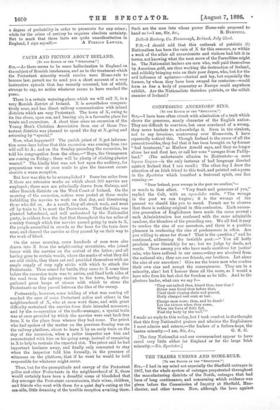FACTS AND FICTION ABOUT IRELAND.
[To THE EDITOR OF TRE "SPECTATOR."] SIR,—As there seems to be some hallucination in England on the subject of Romish intolerance, and as to the treatment which the Protestant minority would receive were Home-rule to become law, permit me to send you a short account of a very instructive episode that has recently occurred, but of which, strange to say, no notice whatever seems to have reached the press.
There is a certain watering-place, which we will call X, in a very Romish district of Ireland. X is nevertheless compara- tively near, and has direct railway communication with inland districts which are very Protestant. The town of X, owing to its fine shore, open sea, and bracing air, is a favourite place for treats and excursions. A short time since an excursion Of the Young Men's Christian Association from one of those Pro- testant districts was planned to spend the day at X, going and returning by "special."
Now, what happened ? The parish priest of X got informa- tion some days before that this excursion was coming from (we will call it) A; and on the Sunday preceding the excursion, he told his congregation from the altar,—" Boys, the Orangemen are coming on Friday ; there will be plenty of sticking-plaster wanted." The kindly hint was not lost upon the auditory, for preparations were at once made to give the innocent excur- sionists a warm reception.
But how was this to be accomplished ? Some ten miles from X there are extensive works on which about 300 navvies are employed ; these men are principally drawn from Galway, and other Romish districts on the West Coast of Ireland. On the morning of the excursion, notices were posted at these works forbidding the navvies to work on that day, and threatening these who did so. As a result, they all struck work, and went off by train to X to meet the Protestants. That the thing was planned beforehand, and well understood by the Nationalist party, is evident from the fact that throughout the ten miles of country through which the navvies passed going by train to X, the people assembled in crowds as the hour for the train drew near, and cheered the navvies as they passed by on their way to the work of blood.
On the same morning, some hundreds of men were also drawn into X from the neighbouring mountains, who joined forces with the navvies on the arrival of the latter ; and all having gone to certain woods, where the marks of what they did are still visible, they there cat and provided themselves with an ample supply of very ugly sticks with which to attack the Protestants. Thus armed for battle, they came to X some time before the excursion train was to arrive, and lined both sides of the road from the railway station to the town, having also gathered great heaps of stones with which to stone the Protestants -as they passed between the files of the enemy.
Fortunately, however, some inkling of what was coming off reached the ears of some Protestant police and others in the neighbourhood of X, who at once went there, and with great difficulty restrained the navvies from their intended massacre ; and by the co-operation of the traffic-manager, a special train was at once provided by which the navvies were sent back free from X to the place from whence they had come. The priest who had spoken of the matter on the previous Sunday was on the railway platform, about to leave X by an early train on the day of the excursion, when a police inspector saw him and remonstrated with him on his going away, instead of remaining in X to help to restrain the expected riot. The priest said he had important business away, and finally only consented to stay when the inspector told him formally, in the presence of witnesses on the platform, that if he went he would be held responsible for whatever might occur.
Thus, but for the promptitude and energy of the Protestant police and-other Protestants in the neighbourhood of X, there would certainly have been a dreadful scene of bloodshed that day amongst the Protestant excursionists, their wives, children, and friends who went with them for a quiet day's outing at the sea-side, little dreaming of the terrible reception awaiting them. Such are the men into whose power Home-rule proposed to
Be fleck Rectory, Co. Fermanagh, Ireland, July 22nd.
P.5.—I should add that this outbreak of patriotic (?). Nationalism has been the ruin of X for this summer, as within a week of the affair all excursionists and visitors had left it in- terror, not knowing what the next move of the Parnellites might be. The Nationalist leaders are men who, well paid themselves by American gold, are thus working the destruction of Ireland,. and selfishly bringing ruin on their poor dupes, who, but for the evil influence of agitators—clerical and lay, but especially the former, by whom they have been swayed for centuries—would form as fine a body of peasantry as Europe could anywhere exhibit. Are the Nationalists therefore patriots, or the selfish enemies of Ireland ?


































 Previous page
Previous page